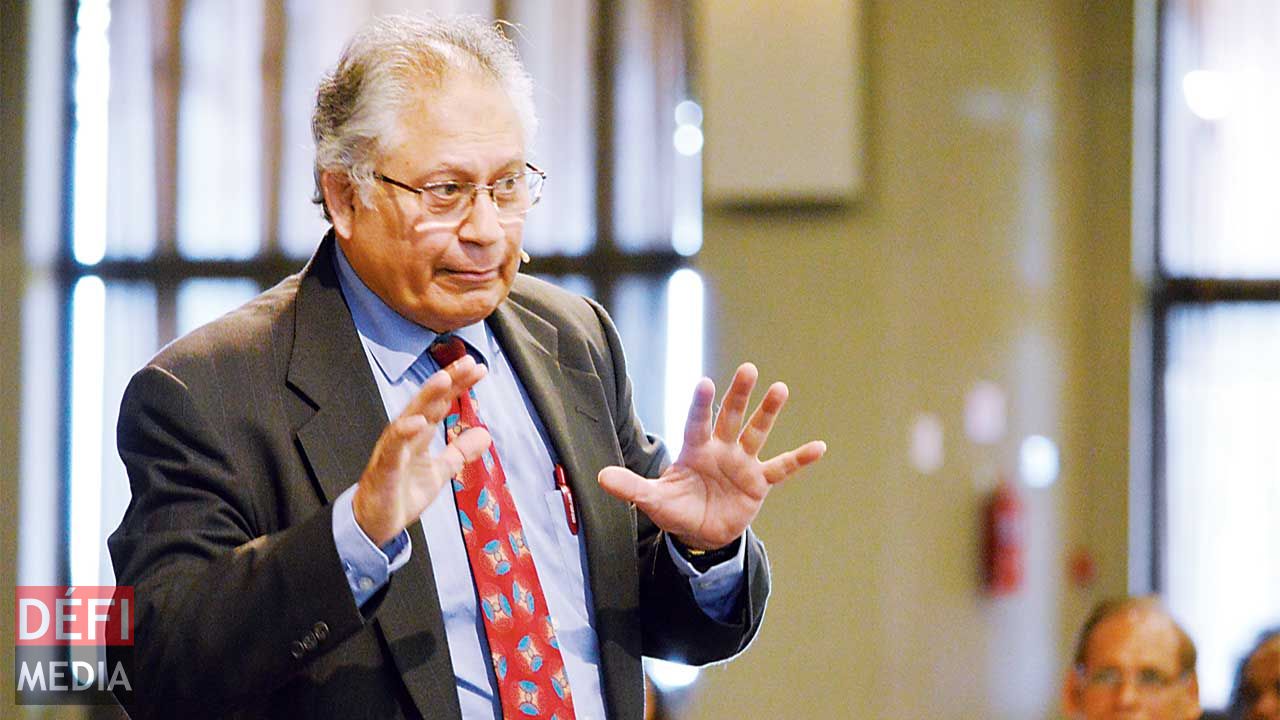
Motivational Speaker and Founder of Qualified Learning Systems Inc, Shiv Khera was in Mauritius last week for a one-day workshop. In an exclusive interview with News On Sunday, he elaborates on the qualities of a leader, positive thinking and creating values in society. The renowned motivational speaker also gives us an insight of his upcoming book due for release in six months.
Publicité
Does one need to be born a leader or can he/she be groomed?
Leadership is a learnt skill. In some places, as per the prevailing culture, people announce in newspapers that a baby girl or baby boy is born. Nowhere is it said that a leader is born, a politician is born or a doctor is born. But in the same newspaper, when you read the obituaries, you find that it is mentioned this person has died and he was a lawyer, accountant or an engineer. What happens is that in life, everyone is born either a boy or a girl, however, by the time death comes knocking on the door, the same baby has become someone else, gained a new status and position in life. This demonstrates that through training, one can become a leader. That is the key observation. There is no such thing as anyone being born a leader. One needs to strive to achieve those qualities.
What difference can a leader make to an organisation, where others might fail?
A leader makes or breaks an organisation. If the organisation is doing well, look at the leadership. If the organisation is messing up, once more, look at the leadership. Culture is always transmitted top down in any family, organization or country, and never bottom-up. A leader is the pillar of an organization. Leadership is the ability to influence thinking resulting in action. If you are not able to get action from your people, you are not a leader. There are no neutral leaders. You can either be a good leader or a bad leader. Good leaders actively guide while bad leaders actively misguide. Good leaders create more leaders while bad leaders create followers. Bad leaders are insecure. There is an enormous difference between an effective leader and a good leader. An effective leader gets action and gets people moving. For example, Hitler was an effective leader, he got people moving. But was he a good leader? No one would answer yes to that question. A good leader has morality as his foundation.
What would the ideal qualities of a leader be? What does he need to focus on?
The major qualities of a leader are: character, competence, courage, clarity of thinking and communication ability. These are five Cs of leadership. If leaders do not have character, this puts into question their goodness. They will sell the country or destroy it. Leaders need to be competent. Competence means skills plus will. There is a difference between skill and competency. Skill is ability. Competence is ability along with the desire to do the job. Besides, there are many skilful people who are incompetent. Courage is another criterion. People who lack courage cannot be trusted. They will never stand for integrity. Weak people cannot be sincere and cowards cannot practise morality. If you practiced cowardice all the time, you won’t show courage when comes the time for big decisions. A leader has clarity of purpose and vision. Vision is the ability to see the invisible. It should not be confused with problem solving skills. It is pre-empting and preventing. A visionary leader can see what others cannot see. Communication ability is the ability to communicate and persuade others to walk along with you.
Added to that, a leader must walk the talk; it is philosophy put into action that gives direction which gets you to the destination. A leader gets power from the three Ps of power: Position power, Personality power and Principle power. Some people get power from position and title, such as ministers, but if you take away the title, the power goes away. There are charismatic personalities like film stars. Personality opens the door, character keeps it open. It is only power that is based on character which is lasting. Some of the greatest leaders of the world were not the most beautiful persons around, they were either short, tall, fat or bald, but they had one thing in common, that is character.
A leader also needs to take three kinds of decisions, which is called three Cs of decision-making: decision of Command, decision of Consultation and decision of Consensus. There is nobody to help, and a leader must take the decisions alone. A leader creates his team, consults them, and then decides. History reflects that great leaders have not always had consensus, but they create consensus.
 About Shiv Khera
About Shiv Khera
Shiv Khera is the Founder of Qualified Learning Systems Inc. An educator, business consultant, a much sought after speaker and a successful entrepreneur, he has many feathers in his cap. He works to inspire and inform people, helping them realize their true potential. He has taken his dynamic unique message around the world. Khera has been recognized as a “Louis Marchesi Fellow” by the Round Table Foundation. He has authored three bestsellers, You Can Win, which sold over a million copies worldwide, Living With Honour and Freedom Is Not Free.
What is the secret formula for success?
There is no secret for success. When you want success as badly as when you need air when you are holding your breath under water, no one can stop you. In the business community, we call it the fire in the belly. In the sports community, we call it the killer instinct. It is rather a burning desire. All people who have succeeded have obsessions. Look at people who are in the athletic field, they are obsessed with their respective field. There is no substitute to hard work and perseverance. Perseverance is the bounce back ability. Success is not measured in terms of how hard you work in life, but it is determined by how you bounce back after you fall. All success stories are stories of failures.
How can someone improve himself to become a better person? Where to start from?
A personal improvement is the process of personal development. It is not an event. People cannot become neuro-surgeons just by taking one course. Similarly, just by taking a leadership course, you do not become a leader overnight. It is a process of learning and internalising the learned lessons. Internalising is taking a forward step. Internalising means converting what we learn into a behaviour. It is only then that you will see results.
 You always talk about habits, changing them or adopting good ones. It is hard to do as the saying goes, old habits die hard. So how can someone make it easier?
You always talk about habits, changing them or adopting good ones. It is hard to do as the saying goes, old habits die hard. So how can someone make it easier?
Everything is based on the pain or pleasure principle. Everything we do in life has one purpose, it is either to gain a pleasure or avoid a pain. For instance, people who smoke know it is bad for their health. They are warned by parents, doctors and friends. They know it is bad for them but still, they continue. Do you know why? They tell you ‘The pleasure is too great and I enjoy it’. Once they find out that they have cancer, they will quit smoking the very next day. Do you know why? Because now the pain is greater than the pleasure. The old habit died overnight.
What are the values we need to implement in the contemporary workplace?
People who talk values in the workplace are showing ignorance of it. There are only three core values: integrity, respect and responsibility. All remaining values as we call them, are substitute values. Sincerity and honesty are supporting values to integrity. It is not about whether we need values in the workplace, we need values in every aspect of our personal life. People who are honest at home are honest at work too. Behaviours do not change. Principles may change but opinions do not change. For instance, you cheat on your customers, your relation will change and if you cheat your spouse, the same will happen.
You coach many companies. What are the weaknesses you notice in businesses?
The major challenge many organisations are facing today is trust and accountability. These two elements are missing. Attitude is bad. According to a study, 63% of people who go to work are disengaged, meaning they do not do the job. 24% are actively disengaged meaning they make sure other people do not do the job. Only 13% of people who go to work actually do the work. The study further demonstrates that people who go to work spend three to four hours per day on their personal social media accounts. Is that we are getting paid for? They need to understand that earning wages without working is equal to stealing.
How can your teachings bring value to organisations which are profit-oriented?
Every organisation must be profit oriented. Who says that values and profits do not go together? In fact, it is a fundamental misconception. The truth is, our credibility determines our profitability. The greater credibility an organisation has, the greater profits it will make. Look at companies like IBM, these companies are credible. It is ridiculous to think that for an organisation to be profitable, it should cheat and be dishonest. It is a misconception. Cheating is cheating no matter what.
What is the difference between positive thinking and delusion?
I always say positive thinking does not guarantee success. Positive thinking with positive action and effort increases the probability of success. Being a positive thinker does not mean you must agree with everything. Being a positive thinker means you are solution oriented. But there are some people who are problem oriented. They have a problem for every solution. A person with a positive attitude cannot be stopped. And a person with negative attitude cannot be helped.
What is the state of values across the world?
Values have degraded all over the world. People are looking for quick fixes. They are looking to become millionaires and billionaires overnight. That is sad. There is a misconception that you are going to make money without working hard. People are willing to make money without earning it. Moreover, check out all around the world, the average age of criminals has gone down. 90 per cent of what we learn at school is not being used in real life. And 90 per cent of what is required to deal with real life is not being taught.
How to implement values in the modern age?
It starts from the top. People at the top need to be committed. They must allow the practise of values in any organisation. A value based culture is needed. How can an entrepreneur teach honesty when he is dishonest himself? Leaders must show example. If they don’t, nothing will work. When you see that there is a leadership crisis, it only means that there is a credibility crisis.
Parenting and the parent-child relationship has never been worse across the world. What had led to this situation according to you?
Today’s parents are like really scared of their kids. They do not have the gut to say NO to their kids. Parenting has become more like a popularity contest. Parents proudly say I am a friend to my kids. The sad part is that kids have enough friends, they need parents. Today’s parents no more accept responsibility. They keep on telling ‘Let my kid decide’. Giving choices to kids is important. Choices without any sense of direction is suicide.
Tell us about your next book?
The title of my next book is “Achieve more, live by design not by default.” It will be published in six months. It will be in line with “You can win” but with a different content and more chapters.

Notre service WhatsApp. Vous êtes témoins d`un événement d`actualité ou d`une scène insolite? Envoyez-nous vos photos ou vidéos sur le 5 259 82 00 !
















![[Document] Réforme électorale : découvrez les propositions du gouvernement](https://defimedia.info/sites/default/files/styles/medium/public/reform_electorale_document.jpg?itok=i-XvATtS)






